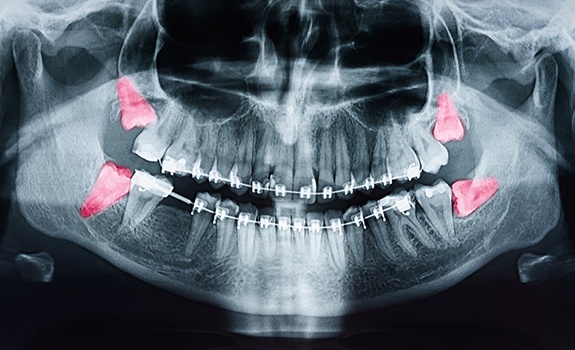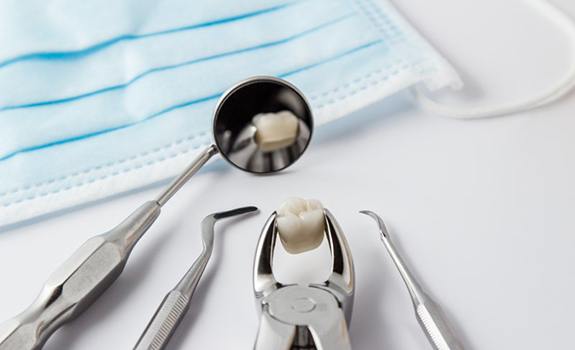Wisdom Tooth Extractions – Rockwall, TX
It’s Wise to Have Your Wisdom Teeth Extracted

If you’re between the ages of 17 and 25, you might’ve started to notice a new set of molars emerging towards the back of your mouth. These are your wisdom teeth, and in many cases, their partial eruption or possible impaction can cause you a great deal of pain! Fortunately, this is something that Dr. Spillman and the team at Spillman Family Dental of Rockwall can easily handle. We can perform wisdom tooth extractions right here in-office, so you don’t have to worry about seeing an unfamiliar specialist. Contact us today to schedule an appointment if you or a loved one needs to discuss potential wisdom tooth extractions.
Why Choose Spillman Family Dental of Rockwall for Wisdom Tooth Extractions?
- Experienced Oral Surgeons
- Prevents Future Oral Health Issues
- Sedation Options Available for Patients with Dental Anxiety
What Are Wisdom Teeth?

Wisdom teeth are commonly referred to as third molars, and they typically make their appearance during later adolescence or early adulthood. Unlike your first two sets of molars, your wisdom teeth often don’t have an adequate amount of room to push through the gumline. This often results in impaction, causing increasing discomfort.
Our wisdom teeth were necessary for our ancestors because of the coarse diets they consumed. However, gradual changes in the formation and development of facial structures have made them no longer essential. Also, since there’s often a lack of room for these teeth, they can cause harm to other nearby teeth if left in place.
Why Do Wisdom Teeth Need to Be Removed?

Some lucky individuals do not need to have their wisdom teeth removed if they erupt without issue. However, most people need theirs extracted before they can cause further damage. Some of the most common reasons for wisdom tooth extraction include:
- Fully or partially impacted wisdom teeth.
- An infection that causes fever, swelling, and pain.
- A misaligned bite.
- Continuous pain or pressure near the back of your mouth.
What to Expect from the Wisdom Teeth Procedure

Dr. Spillman wants you to feel comfortable throughout your extraction, so you can expect to be numbed with local anesthesia. Sedation options are also available for additional comfort. Once you’re in a calm state, the procedure can be carried out. Partially erupted teeth can be gently loosened using special instruments until they’re able to be removed. However, fully impacted teeth will require a surgical approach where the gums are opened, and each molar is removed in sections to help minimize the amount of bone loss.
Recovering from Wisdom Teeth Extraction

After the procedure is complete, gauze is placed over the surgical sites to reduce bleeding and encourage the formation of blood clots, which play an important role in the healing process. Once you’ve wrapped up the appointment, you’ll need someone to escort you home if you’ve been given dental sedation or general anesthesia.
At home, you should follow your aftercare instructions closely. Take any medications as prescribed, use cold compresses to alleviate swelling, and be careful when cleaning your mouth—disrupting your blood clots will delay the healing process! You’ll also be expected to adhere to a liquid diet at first before transitioning to softer foods. Some additional tips you should keep in mind during recovery include:
- Don’t use a drinking straw.
- Don’t smoke or use tobacco products.
- Avoid exercise or strenuous physical activity for the first few days.
Wisdom Tooth Extraction FAQs

Are your wisdom teeth starting to cause discomfort in your smile? While extractions may be necessary to help you regain good oral health, it’s natural to want to know more about the treatment before committing to anything. That’s why our team has compiled and answered some of our most frequently asked questions about wisdom tooth extractions in Rockwall. We’ll be more than happy to walk you through the procedure and schedule your next appointment. Feel free to reach out to our office if you don’t see the information you’re looking for!
Is Wisdom Tooth Removal Painful?
Like in most dental procedures, our team will make sure to completely numb your mouth with a local anesthetic before starting any work. This is to ensure that you remain pain-free throughout your entire appointment. You’ll also likely be sedated to both calm your nerves and provide a more pleasant experience. For this reason, the treatment itself shouldn’t involve any pain. That said, it’s normal for patients to experience mild soreness for a few days afterward. This can be managed by taking over-the-counter and/or prescribed pain relievers, using a cold compress, and following your dentist’s aftercare instructions closely.
How Long Does Wisdom Tooth Surgery Take?
A wisdom tooth extraction usually takes around 15 to 20 minutes to complete, which means it can take about 90 minutes or so to remove all four molars. However, the amount of time it’ll take will depend on certain factors, such as the position or angle of the tooth. For instance, some wisdom teeth may erupt normally while others can be impacted, affecting your nearby pearly whites. Whatever the length of your procedure happens to be, you’ll likely remember nothing about it if you’re provided with sedation therapy. Before starting your treatment, your dentist will give you an accurate timeframe for your procedure so you can plan accordingly.
What’s the Best Age to Get Wisdom Teeth Removed?
While there isn’t a set age when you need to remove your wisdom teeth, most dental professionals prefer to extract them in early adulthood. Though it’s possible to pull these molars later in life, the process and healing time can both be much easier when a person is younger. That’s why, if your dentist recommends that you get your wisdom teeth removed, it’s best to have this done as soon as possible. This will help you avoid future risks or complications, such as impaction, cysts, decay, and damaging your surrounding teeth.
Why Do We Have Wisdom Teeth?
Nowadays, wisdom teeth seem to be problematic for some people. However, they were essential for our early human ancestors. Many years ago, a person’s diet mainly consisted of raw meals, like meat, berries, nuts, leaves, and roots. Since they didn’t slice up or cook their food, chewing was their main tool. This meant they needed a broader jaw and strong molars to withstand the excessive pressure. For this reason, wisdom teeth could erupt normally without causing issues. Today, our food is softer, processed, and easier for us to consume, especially since we use tools to cut, cook, and prepare it. Our jaws also got smaller and no longer have enough room to accommodate wisdom teeth like before. In many cases, it can become problematic if you don’t extract them.
